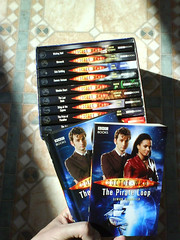Wright talks to a whole bunch of important people: critic and writer Roz Kaveney; Mark Newton, assistant editor on the Friday the 13th and Nightmare on Elm Street books; my boss Justin Richards; writers Rob Williams, Peter David, Kevin J Anderson, Una McCormack and, er, me.
In such esteemed and clever company, I get just a paragraph towards the end. But here's what I originally said:
Let's get this one straight out of the way, franchise work is maybe regarded as not creative in the same way that 'original' work is. What's your take on that?The SFX website boasts Rob Williams answering the same questions. Incidentally, this is my 650th post, in 3 years and 27 days.
Original work probably seems harder because you've got to start from scratch – the people, the setting, the tone. A franchise at least gives you a rough idea of what's expected and your major characters. But you've also got to find a way to do new things within that same set-up and that gets trickier the longer a franchise has been going. There's 45 years of Doctor Who – television episodes, books, audio plays, comic strips. Fans are quick to spot repetition, but the fun – for you and for them, I think – is in producing new twists and ideas. It's sort of a parlour game. Is that any less creative? I'm not sure. It's certainly different.
I think franchise writing is also safer for a writer. There are fixed guidelines, word counts and contracts, so it's a lot less risky to write. Original work doesn't just need writing, it needs much more work to get publishers interested and then to get punters to buy it. That's a lot of investment and there might be very little return. With a franchise you know there's already an audience.
Are the rules with existing franchises slightly different to when you're pitching a new [thing]?
I've pitched original things to other people, but not very successfully. So what do I know?
Related to the above – do fans expect certain things of franchises and is that something you think about very much?
Yes, I think they probably do, but I'm not sure how you go about measuring those expectations. There are vocal minorities in most fan communities whose opinions could skew your thinking. But also you want to surprise and excite your readers, so you're looking for new perspectives anyway. You can talk to fans, or eavesdrop on their
conversations, but I think you can only really respond to your expectations. When pitching my first Doctor Who book I was thinking about the kinds of Doctor Who books I'd liked reading myself. Ones where the Doctor and his companions were prominent. Ones with mad ideas. Ones where I didn't know where it was going to go next. Even if it's not a franchise you know particularly well, you do your research and you work out what elements you yourself are a fan of.
To what extent can you decide plotlines?
For the Doctor Who books, all these things have to be approved by a great number of people but you're the one coming up with the ideas. My first Doctor Who novel, The Time Travellers, is pretty much the 5,000 word synopsis I send on spec to BBC Books in early 2003. My second Doctor Who novel, The Pirate Loop, began as a whole series of ideas I sent range editor Justin Richards after he asked for something science-fiction. We spent about a week batting the ideas back and forth, pruning them into shape. That outline then had to be approved and the approvers made some suggestions. I think the Doctor and Martha spent less time together in the original outline.
I've also commissioned stories where I gave authors a one-line or one-paragraph outline and then left them to do the rest. That works well if you're commissioning a whole series. It seems to work best if the authors aren't given too many things to squeeze in and are left to come up with the plot themselves. They tend to be keener and more creative when its their own idea.
How does the commissioning/editing process work?
These days, they call you. The editors might have an idea for the kind of thing they're after – a space story, or anything so long as it isn't set in London. They might tell what else they've got lined up and just want you to fill the gap. There's usually some general guidelines to the series – rules and footnotes you might not pick up as an outside observer. There's a set word count, deadline and contract, so you just need to come up with the outline.
Once that's approved, you go away and write the thing. Then there's various stages of editorial – a close reading by your immediate editor who might ask for all manner of changes, a proof read by a sub who'll be checking grammar and inconsistencies, and then the panel of approvers who check for tone and style. They might also ask you to tweak things to make them more in keeping with forthcoming stories.
Do you think such developments as the boom in fan fiction/online shared worlds/a more 'interactive' future will change our ideas about what shared universes are?
Fan fiction has been going a long time. There's a wealth of authors now who started out in fanzines. Back in 1990 Virgin Publishing were so impressed with the Doctor Who stories published by fans that they invited them to pitch for their New Adventures line. But that's a rare example, at least as far as I know, of a publisher actually reading fan fiction – or admitting that they have. Fan fiction's value – to me, anyway – is that it gets wannabe writers writing and gets their writing seen. You gain confidence and practical skills, which helps when then sending your work out to the professional publishers.
Do your 'original' work and your franchise work feed off each other?
Yes. You come up with ideas that maybe don't fit the thing you're working on just then, so you jot them down to use later in something else unrelated. Or you go off on tangents which prove to be whole other stories. But also just the practical stuff plays a part – you work with an editor on a franchise line who then gets a job with a
different publisher. It's even smaller scale stuff – I've learnt tricks writing copy for the government and advertising that's been useful in my fiction. My own sentence structure is certainly better having had to produce and edit other people's stuff. The great thing about writing – especially if you don't really have any other abilities – is that you can make use of any experience.
Anything else you'd like to add?
Um…
A brief bio of yourself would help a lot too.
I am 31 [not any more] and live in south London with a bright wife and a dim cat. I have written stories for as long as I can remember, though for a long time not very good ones. I started pitching to 2000AD at the age of 16, and the Doctor Who books when I was 18. It took 10 years to get a book commissioned, though by then I'd had some Doctor Who short stories published by Big Finish. I've been a freelance writer since 2002. I'm editing my third anthology of Doctor Who short stories at the moment. "How The Doctor Changed My Life" features 25 stories by first-time authors of fiction, the winners of a competition we ran last year. It is published in September 2008.










